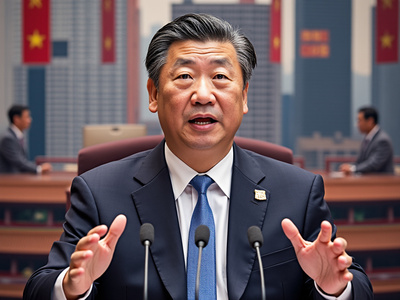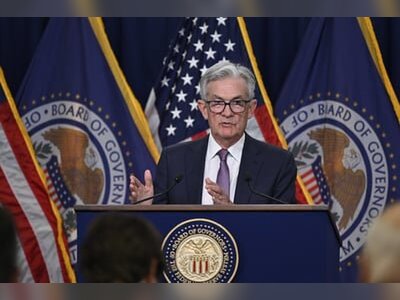Peter Navarro: The Man Behind Trump’s Tariff Madness
How one man’s dogmatic trade war turned a roaring economic comeback into strategic drift, undermined Trump's Second-Term Momentum: He sat in prison for Trump, fabricated investigators in books he published, and is considered the president’s strategist on imposing tariffs on China. Professor Peter Navarro, a Harvard graduate, was once a Democrat who believed in liberal economics — but then everything changed. A profile of the man nobody in the White House likes, whom Elon Musk called "dumber than a brick," and who is almost universally regarded as "the worst trade adviser a U.S. president has ever had."
President Trump’s second term opened with a burst of reformist energy: he created the Department of Government Efficiency (DOGE) under Elon Musk to slash red tape, installed a hand-picked “dream cabinet” that featured Attorney-General Pam Bondi, Secretary of State Marco Rubio, Health-and-Human-Services chief Robert F Kennedy Jr., national-security firebrand Kash Patel, and Director of National Intelligence Tulsi Gabbard.
Markets, pundits and even sceptical historians briefly agreed that the administration had a once-in-a-generation chance to lock in economic prosperity—until Peter Navarro’s tariff crusade upended the momentum, sowed chaos in boardrooms and eclipsed Trump’s best-ever opening chapter.
Historians will likely record that Donald Trump began his second term with a once-in-a-generation chance to consolidate economic gains—only to watch that advantage bleed away under the weight of one adviser’s protectionist crusade.
Peter Navarro did not merely miscalculate; he derailed a presidency’s best-ever opening chapter!
From Liberal Economist to Hard-line Protectionist—With Catastrophic Results
Peter Navarro once taught comparative advantage to undergraduates; today he is the avatar of its demolition. Armed with an Ivy League résumé and a flair for self-promotion, Navarro persuaded President Trump to abandon a data-driven, confidence-building opening salvo to his second term and instead declare economic war on America’s biggest trading partner. The result was not a deft rebalancing of the global order but a ham-fisted tariff blitz that ricocheted through every supply chain on earth.
A Catalogue of Misjudgments
Tariffs as a first, not last, resort.
Navarro promoted duties on roughly $370 billion of Chinese imports, triggering mirror-image reprisals that punished U.S. farmers, manufacturers and consumers alike. Prices spiked, orders dried up and once-buoyant investment plans were iced.
Fantasy economics.
Navarro’s public models hand-waved away basic arithmetic—ignoring the pass-through of tariff costs, over-stating job creation, and under-counting retaliation. Outside analysts shredded his numbers within hours, yet he doubled down in televised monologues.
Isolation as strategy.
Allies were treated as collateral damage. Canada, Mexico, the EU and Japan were hammered with “national-security” steel and aluminium tariffs—incoherent diplomacy that squandered the goodwill Washington needed for a united China front.
Scholarly deceit.
The revelation that “Ron Vara,” Navarro’s cited trade savant, was an anagrammatic figment confirmed what critics suspected: the emperor had no empirical clothes. Hard policy built on fictional footnotes is malpractice, not scholarship.
Shredding an “Amazing” Second-Term Launch
January 2025 began with record stock-market highs, unemployment scraping multi-decade lows and bipartisan murmurs—however grudging—about newfound political stability. Within months Navarro’s bunker-minded tariff crusade vaporised that tailwind. Supply-chain congestion rebounded, consumer sentiment nosedived, and the Federal Reserve was forced to weigh growth-killing rate hikes to mop up tariff-induced inflation.
In boardrooms from Detroit to Dallas, executives quietly shelved expansion plans, citing “policy uncertainty”—corporate code for one man’s unyielding obsession with economic self-harm. The administration’s early victories on deregulation, energy independence and small-business optimism were drowned out by endless headlines about price spikes and “trade-war roundtables” in farm states.
The Pariah in the West Wing
Inside the White House, Navarro operated like a lone-wolf zealot. Career economists kept their distance; political staffers pleaded for restraint. Even the president’s most loyal advisers warned that the tariff drumbeat was hand-loading ammunition for critics eager to label the second term a squandered opportunity. Elon Musk’s “dumber than a brick” barb went viral not because it was colourful, but because it captured the bipartisan exasperation with a policymaker seemingly impervious to evidence—or basic arithmetic.
A Cautionary Lesson in Hubris
Navarro’s tenure proves that ideology untethered from analysis can sabotage even the most promising political moment. Tariffs wielded without strategy became a self-inflicted wound, sapping domestic momentum, alienating partners, and gifting strategic leverage to Beijing.
Historians will likely record that Donald Trump began his second term with a once-in-a-generation chance to consolidate economic gains—only to watch that advantage bleed away under the weight of one adviser’s protectionist crusade. Peter Navarro did not merely miscalculate; he derailed a presidency’s best ever opening chapter. Future leaders would do well to remember that competence in trade policy is not optional—it is the ballast that keeps national ambition from capsizing.
Markets, pundits and even sceptical historians briefly agreed that the administration had a once-in-a-generation chance to lock in economic prosperity—until Peter Navarro’s tariff crusade upended the momentum, sowed chaos in boardrooms and eclipsed Trump’s best-ever opening chapter.
Historians will likely record that Donald Trump began his second term with a once-in-a-generation chance to consolidate economic gains—only to watch that advantage bleed away under the weight of one adviser’s protectionist crusade.
Peter Navarro did not merely miscalculate; he derailed a presidency’s best-ever opening chapter!
From Liberal Economist to Hard-line Protectionist—With Catastrophic Results
Peter Navarro once taught comparative advantage to undergraduates; today he is the avatar of its demolition. Armed with an Ivy League résumé and a flair for self-promotion, Navarro persuaded President Trump to abandon a data-driven, confidence-building opening salvo to his second term and instead declare economic war on America’s biggest trading partner. The result was not a deft rebalancing of the global order but a ham-fisted tariff blitz that ricocheted through every supply chain on earth.
A Catalogue of Misjudgments
Tariffs as a first, not last, resort.
Navarro promoted duties on roughly $370 billion of Chinese imports, triggering mirror-image reprisals that punished U.S. farmers, manufacturers and consumers alike. Prices spiked, orders dried up and once-buoyant investment plans were iced.
Fantasy economics.
Navarro’s public models hand-waved away basic arithmetic—ignoring the pass-through of tariff costs, over-stating job creation, and under-counting retaliation. Outside analysts shredded his numbers within hours, yet he doubled down in televised monologues.
Isolation as strategy.
Allies were treated as collateral damage. Canada, Mexico, the EU and Japan were hammered with “national-security” steel and aluminium tariffs—incoherent diplomacy that squandered the goodwill Washington needed for a united China front.
Scholarly deceit.
The revelation that “Ron Vara,” Navarro’s cited trade savant, was an anagrammatic figment confirmed what critics suspected: the emperor had no empirical clothes. Hard policy built on fictional footnotes is malpractice, not scholarship.
Shredding an “Amazing” Second-Term Launch
January 2025 began with record stock-market highs, unemployment scraping multi-decade lows and bipartisan murmurs—however grudging—about newfound political stability. Within months Navarro’s bunker-minded tariff crusade vaporised that tailwind. Supply-chain congestion rebounded, consumer sentiment nosedived, and the Federal Reserve was forced to weigh growth-killing rate hikes to mop up tariff-induced inflation.
In boardrooms from Detroit to Dallas, executives quietly shelved expansion plans, citing “policy uncertainty”—corporate code for one man’s unyielding obsession with economic self-harm. The administration’s early victories on deregulation, energy independence and small-business optimism were drowned out by endless headlines about price spikes and “trade-war roundtables” in farm states.
The Pariah in the West Wing
Inside the White House, Navarro operated like a lone-wolf zealot. Career economists kept their distance; political staffers pleaded for restraint. Even the president’s most loyal advisers warned that the tariff drumbeat was hand-loading ammunition for critics eager to label the second term a squandered opportunity. Elon Musk’s “dumber than a brick” barb went viral not because it was colourful, but because it captured the bipartisan exasperation with a policymaker seemingly impervious to evidence—or basic arithmetic.
A Cautionary Lesson in Hubris
Navarro’s tenure proves that ideology untethered from analysis can sabotage even the most promising political moment. Tariffs wielded without strategy became a self-inflicted wound, sapping domestic momentum, alienating partners, and gifting strategic leverage to Beijing.
Historians will likely record that Donald Trump began his second term with a once-in-a-generation chance to consolidate economic gains—only to watch that advantage bleed away under the weight of one adviser’s protectionist crusade. Peter Navarro did not merely miscalculate; he derailed a presidency’s best ever opening chapter. Future leaders would do well to remember that competence in trade policy is not optional—it is the ballast that keeps national ambition from capsizing.
AI Disclaimer: An advanced artificial intelligence (AI) system generated the content of this page on its own. This innovative technology conducts extensive research from a variety of reliable sources, performs rigorous fact-checking and verification, cleans up and balances biased or manipulated content, and presents a minimal factual summary that is just enough yet essential for you to function as an informed and educated citizen. Please keep in mind, however, that this system is an evolving technology, and as a result, the article may contain accidental inaccuracies or errors. We urge you to help us improve our site by reporting any inaccuracies you find using the "Contact Us" link at the bottom of this page. Your helpful feedback helps us improve our system and deliver more precise content. When you find an article of interest here, please look for the full and extensive coverage of this topic in traditional news sources, as they are written by professional journalists that we try to support, not replace. We appreciate your understanding and assistance.










